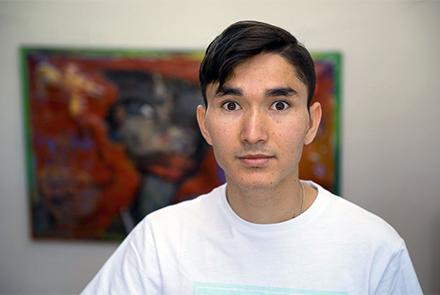Finnish police are preparing to deport 21-year-old Mojtaba Hassani back to Afghanistan although he has a full-time job and all of his other family members have been granted Finnish residence permits, Yle reported.
Hassani has lived in Finland with his mother, step-father and three siblings since 2015 and is currently employed full-time as a cleaner while attending Finnish ninth grade.
Hassani's rhumba with Finnish immigration authorities began when his family arrived in Finland in 2011, at the invitation of his step-brother. At the time, Hassan was the blended family's third child at the age of 11. But for some reason still unknown to this day, he was not invited to join the family then.
Hassani lived in a Taliban-controlled part of Afghanistan with his grandmother until he decided to join his family in Finland at the age of 15.
It took another two years for the young man to make it to Finland, because he took on work in Iraq and Turkey to earn money to pay human smugglers to facilitate his trip.
In 2015, Hassani finally took a ferry from Sweden to Finland, where he was soon able to find the rest of his family on the basis of his mother's name.
"So far no one has been able to figure out why he was not included in a family reunification application. It's a cosmic lottery that no one would have wanted," said Sanna Valtonen, head of the NGO Support for Asylum Seekers. Valtonen is also assisting Hassani.
Valtonen said she suspects that because of a lack of Finnish language skills, the family didn't know how to press for Hassani to join them in Finland.
Meanwhile DNA testing confirmed Hassani's relationship to his mother. However the family reunification process ran aground over Hassani's age.
The Finnish Immigration Service Migri decided to investigate Hassani's age, although he had a "tazkira", an Afghan identity document, which was also used to confirm his siblings' ages.
However, the result of the age tests spelled bad news for Hassani: overnight, the test raised his age, declaring him to be an adult.
According to Valtonen, in international jurisprudence, a person's age should be determined within a two-year range, because the age-testing method does not produce precise results. In Finland, immigration officials examine the teeth or wrist to determine age.
In Hassani's case, the test determined that he was 10 months older than his identity documents stated.
The tazkira is an Afghan identity document. It was enough for Finnish authorities to establish age and identity for Hassani's siblings in 2011. However, Hassani had to undergo an age test four years later.
Hassani appealed the test results at the EU Court for Human Rights, but lost the motion.
After his family reunification application foundered, Hassani applied for a residence permit as an asylum seeker. However this application was also rejected - immigration officials said it was because he failed to meet the criteria for international protection.
Valtonen said that a positive outcome would have been almost impossible for someone in Hassani's position, since he had left Afghanistan when he was just 15 years old - at that age he had not yet been personally threatened or assaulted.
"Even the Taliban doesn't persecute children," the activist said.
Hassani challenged that decision in the Supreme Administrative Court, but that motion was also turned down.

